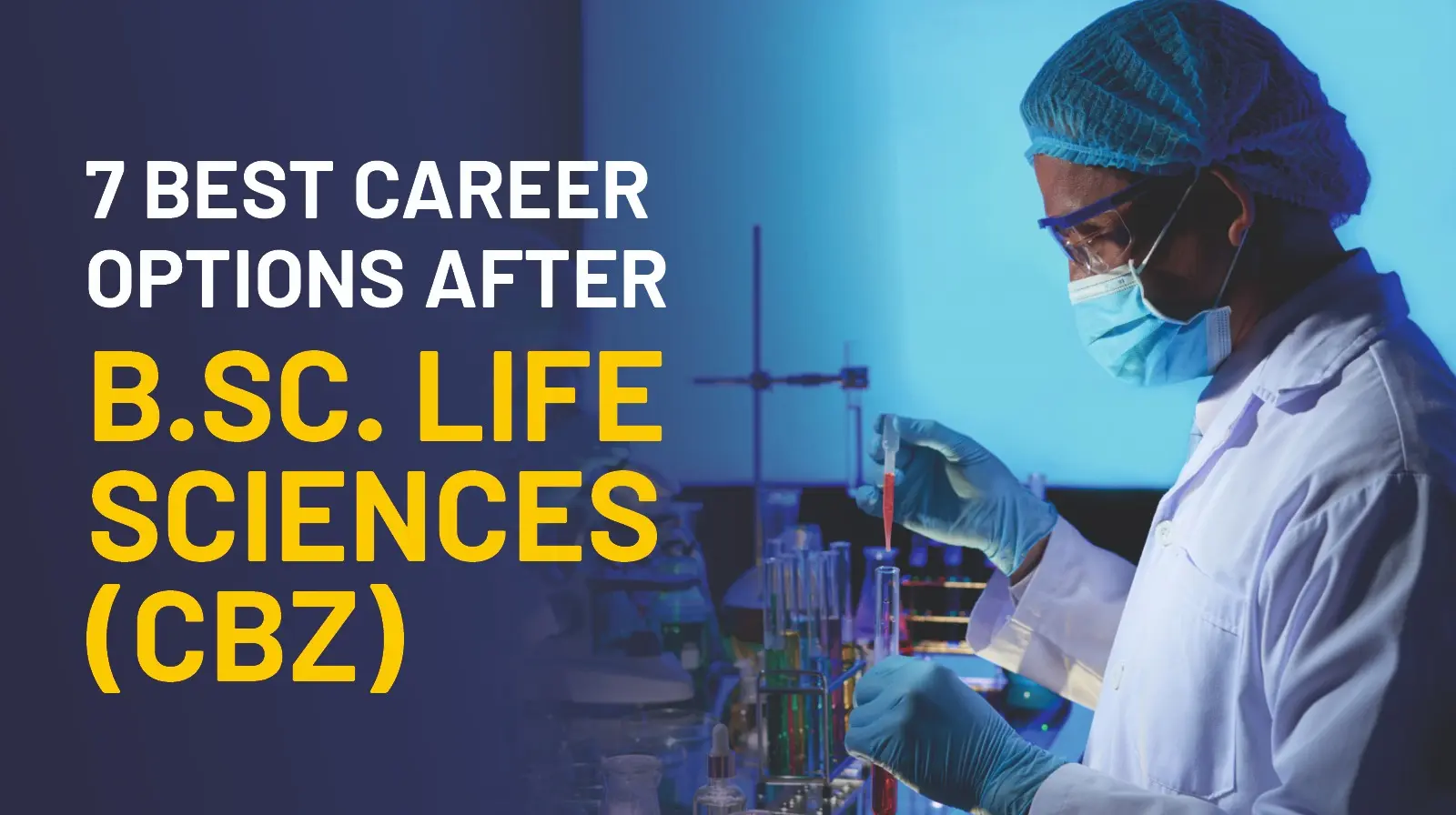The life sciences field has witnessed remarkable growth in India and internationally in terms of knowledge advancement, career prospects, and available specialization areas. Life Sciences is a study of molecular aspects of all types of living organisms, which includes nervous structure, genetic composition, bodily systems, and the nearby environment, forestry, and agriculture. The use of advanced technology in monitoring, observation and computation has introduced an interdisciplinary and varied approach, leading to increased research opportunities and career prospects.
The given rise in numerous opportunities in the field has helped various graduates explore suitable jobs in the domain and aspirants to pursue specialities like pharmacology, biotechnology and genetics. Exploring the different specialties within life sciences can lead to fulfilling and promising career paths.
In this blog we will list down the top 10 best career options after B.Sc. Life Sciences and look at their key responsibilities they perform.
Career Options after Pursuing B.Sc. Life Sciences (CBZ)
A Bachelor of Science(B.Sc.) in Life Sciences opens a gateway to exciting career prospects in high paying fields like biotechnology, clinical research, bioinformatics, pharmaceutical sales, and microbiology. Here are some of the exciting job opportunities after B.Sc. Life Sciences program:
1. Pharmacologist
Pharmacologists are the scientists or physicians who study how the chemical substances interact with the human body and other organic life processes, as well as the beneficial and detrimental effects of chemicals on specific body parts. Their main aim is to have a detailed understanding about diseases, create new pharmaceuticals to treat such diseases and make sure that people consume them safely.
Roles and Responsibilities: Typical job duties involve:
- Develop and carry out experiments, which includes tests on cells, animals and human volunteers.
- Using specialised computer applications to analyse and interpret data.
- Making Recommendation based on the research and experiments found.
- For publication purposes, carrying out research and writing papers in specialist journals.
2. Biotechnologist
A Biotechnologist is a scientist who studies biology and designs the products and technologies based on the research findings. They work in diverse working fields including environmental science, agriculture, and medicine. Furthermore, Biotechnologists use DNA and other biological molecules to develop new drugs, improve crop yields, and create sustainable biofuels.
Roles and Responsibilities: The roles and responsibilities of Biotechnologist are-
- Development of new biotechnological products, processes, or applications.
- Conducting experiments, analysing data, and interpreting results using specialised equipment and techniques.
- Investigating and assessing source materials for potential applications.
- Creating and enhancing biotechnological products, including drugs, biofuels, vaccines, and genetically modified organisms.
- Checking that regulatory standards are met by products and are safe for use via testing and quality assurance protocols.
3. Microbiologist
Microbiologists are the ones who study microscopic organisms including fungi, algae, the tiny flora that live in the human digestive system, and viruses that make humans sick. They also work in identifying the bacteria which causes disease or ensure that there are no harmful microorganisms in the food supply. As per U.S. Bureau of Labor Statistics, employment of microbiologists is projected to grow at the rate of 7% from 2023-33.
Roles and Responsibilities: The roles and responsibilities of microbiologists are-
- Plan and Perform complex non-routine and routine complex procedures on microorganisms.
- Study various cultures of microorganisms in isolation according to standard inhibition and ensure control over moisture and temperature.
- Tracking of microorganisms in different environments.
- Design new investigation techniques to evaluate samples from a range of sources.
- Use the findings to pharmaceutical products- such as medicines and vitamins, and develop new treatments of diseases.
- Review, assess, and validate investigative findings and analytical results.
4. Clinical Research Associate
A clinical research associate is a healthcare professional who is responsible for conducting clinical trials which evaluate new drugs, treatments, and medical devices. They involve running the clinical trial ethically and as per the regulatory standards. Moreover, they monitor the study’s progress, verify data precision, and ensure safety and welfare of participants.
Roles and Responsibilities: The roles and responsibilities of clinical research associate include-
- Overseeing the progress of clinical trial and data collection.
- They validate the accuracy and integrity of the trial data.
- Ensure compliance with regulations and participant safety.
- They have to collaborate with medical professionals and researchers.
- Responsible for communicating with regulatory authorities.
- Identifying and resolving potential issues or deviations.
- Maintaining detailed documentation and records.
- They provide guidance and training to clinical trial staff as well.
5. Environmental Consultant
Environmental Consultants is a professional who provides expert guidance on managing environment issues to businesses, government agencies, and organizations. They play a critical role in helping clients complying with environmental regulations, assess and mitigate environmental risks, and develop sustainable practices. They perform duty on projects like conservation, waste management, and renewable energy.
Roles and Responsibilities: Here is a list of roles and responsibilities needed to perform as Environmental Consultant:
- They assess the environmental impact of proposed projects or developments through environmental impact assessments (EIAs) and environmental site assessments (ESAs).
- They identify the contamination or environmental issues at sites by conducting soil, water, and air sampling and analysis.
- Ensure clients comply with environmental regulations and standards established by government agencies and other regulatory bodies.
- They analyse and interpret environmental data to estimate risks and impacts, and offer mitigation recommendations.
- They gather, analyse, and interpret environmental information to evaluate risks and impacts, and offer recommendations for mitigation.
6. Computational biologist
A Bioinformatics scientist, a computational biologist uses both data science skills and biological knowledge to interpret and communicate new data. The field covers a range of biological studies such as drug development, ecology, and genetics, and has grown in recent years alongside biotech and pharmaceutical sectors.
Roles and Responsibilities:
- Develop a data analysis plan, deciding what algorithms and software are best suited to the project.
- Designing the programs to use and analyse the data.
- Develop and apply methods to create portfolios of protein engineering experiments.
- Ability to handle technical and troubleshoot scientific challenges and contribute their resolution.
- Carrying out protein crystallography, which includes initial screening, data collection, optimization of crystal quality, and determination of structure.
- Review of technical reports which are prepared internally. Making oral presentations to scientists and management, and publishing and presenting them externally.
7. Quality Control Analyst
Quality Control Analysts is considered as one of the best-paying career opportunities which graduates can pursue after B.Sc. in Life Sciences. Their role is to make sure specific standards of quality and safety are met by the products. Moreover, in different phases of production they also test products and materials to detect flaws and ensure uniformity.
Roles and Responsibilities:
- Performed detailed statistical analysis to detect issues, trends, and areas for enhancement in process and product quality.
- Conduct regular quality assurance(QA) audits to ensure keep up to the accepted standards and regulatory compliance.
- They have to collaborate with cross-functional teams for developing and maintaining quality standards and procedures.
- Produce and analyse test results well-rounded detailed reports findings and commend actionable improvements.
Final Thoughts
B.Sc. Life Sciences offers diverse, promising career paths in fields like pharmacology, biotechnology, and environmental consulting. Graduates can contribute to scientific advancement and address global challenges through research, drug development, and sustainability efforts. The field’s rapid growth provides ample opportunities for specialization and professional development.
Article written by
Blog Categories
- 1
- 3
- 1
- 1
- 17
- 8
- 16
- 1
- 1
- 1
- 1
- 1
- 1
- 2
- 1
- 1
- 5



